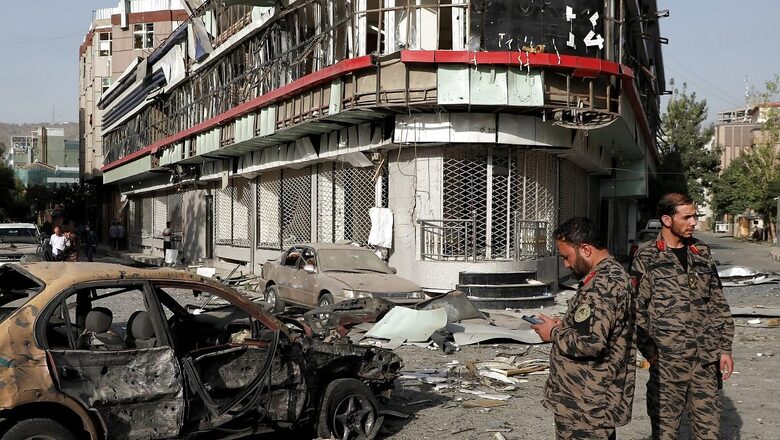
views
Nearly 20 years after they were ousted by US-led troops, the Taliban are now poised to regain power in Afghanistan. The capital city, Kabul, fell to the insurgents on August 15, following which former President Ashraf Ghani fled to Tajikistan.
The Taliban attacks in Afghanistan essentially began in May when the US started the final stage of withdrawing its military presence in the war-torn country and bring the last of its troops home. Afghan civilians are now facing the worst time as they are being brutally killed by Taliban insurgents posing to return to power. The world is now keenly following the evolving situation in Afghanistan as the Taliban consolidates its position further in the country.
WHO ARE THE TALIBAN?
The Taliban emerged in the early 1990s during the cold war. Afghan mujahideen or Islamic guerilla fighters waged a war against Soviet occupation for around a decade. According to a PTI report, they were funded and equipped by an array of external powers, including the United States.
In 1989, the Soviets pulled out and that marked the beginning of the collapse of the Afghan government that had relied heavily on them. By 1992, a Mujahedeen government was formed but suffered from bloody infighting in the capital.
The unfavourable conditions on the ground created fertile ground for the emergence of the Taliban. The Taliban is believed to have first appeared in Saudi Arabia-funded hard-line religious madrassas in northern Pakistan in the early 1990s.
Some of them were Mujahedeen fighters against the Soviets. In 1994, the Taliban started a military campaign from the south of Afghanistan. By 1996, the group had captured the Afghan capital, Kabul, without much resistance.
The US Pullout
After announcing that US troops would leave the country by August 31, the Joe Biden administration has moved fast to affect the pullout with the plan being to leave only 650 troops to secure the US embassy in Kabul.
Biden reiterated his commitment last week to get US troops out of the country 20 years after they landed in Afghanistan following the 9/11 attacks. Biden believes the US has achieved the objectives of decimating the al-Qaeda group and ensuring that the Afghan soil is not used for another attack on America that had seen it invade Afghanistan in the first place and that the task of nation-building should be now left to the Afghan people.
“We achieved those objectives, that’s why we went. We did not go to Afghanistan to nation-build. And it’s the right and the responsibility of the Afghan people alone to decide their future and how they want to run their country,” Biden said last week at the White House.
US troops have already emptied out of the Bagram airbase, which was a key base for its military operations in Afghanistan. The abandoning of the Bagram airbase signified the symbolic end to US’ involvement in the country and Pentagon has said that the withdrawal of American forces is 90 per cent complete.
But Biden acknowledged that the troop withdrawal leaves the democratically elected government of Ashraf Ghani in a precarious position. “The likelihood there’s going to be one unified government in Afghanistan controlling the whole country is highly unlikely,” he said.
Cosying up to China
Late last month, China’s foreign minister met a delegation of high-level Taliban officials signalling warming ties ahead of the US pullout.
Photos showed Wang Yi posing with senior Taliban leader Mullah Abdul Ghani Baradar and his delegation in the city of Tianjin, then sitting down to talks. The highly conspicuous show of friendliness had the appearance of a diplomatic mission at a time when the Taliban are craving legitimacy.
China has an interest in pushing the Taliban to deliver on peace talks or at least reduce the level of violence as they gobble up territory from Afghan government forces.
China and Afghanistan share a narrow border high in the remote Wakhan Valley, and China has long been concerned about a possible spillover of Islamic militancy into its formerly volatile Xinjiang region. China has also signed deals for oil, gas and copper mining in Afghanistan, although those have long been dormant.
The Taliban are a pivotal military and political force in Afghanistan and are expected to play an important role in the process of peace, reconciliation and reconstruction,” Wang said.
Prancing with Pakistan
Baradar’s visit came shortly after Pakistan’s foreign minister and intelligence chief made their trips to China. Pakistan is seen as key to peace in Afghanistan. The Taliban leadership is headquartered in Pakistan and Islamabad has used its leverage, which it says is now waning, to press the Taliban to talk peace.
While the Tianjin meeting could be seen as a snub at the U.S., Washington has been meeting with China and Russia to produce statements calling on the Taliban to enter into a peace deal.
On July 29, Pakistan Prime Minister Imran Khan had called the Taliban “normal civilians”, saying they were not military outfits. In an interview with PBS NewsHour aired Tuesday night, Khan stressed that Pakistan hosts three million Aghan refugees of which the majority are Pashtuns, the same ethnic group as the Taliban fighters.
“Now, there are camps of 500,000 people; there are camps of 100,000 people. And Taliban are not some military outfits, they are normal civilians. And if there are some civilians in these camps, how is Pakistan supposed to hunt these people down? How can you call them sanctuaries?” he argued.
Mosying around Moscow
A delegation of the Taliban also visited Moscow last month to offer assurances that their quick gains on the ground in Afghanistan do not threaten Russia or its allies in Central Asia.
Taliban advances have forced hundreds of Afghan soldiers to flee across the border into Tajikistan, which hosts a Russian military base. Tajikistan in turn has called up 20,000 military reservists to strengthen its southern border with Afghanistan.
Taliban spokesman Mohammad Sohail Shaheen was quoted as saying that they won’t allow anyone to use the Afghan territory to attack Russia or neighbouring countries.
“We have very good relations with Russia, he was quoted by Russian agency Tass as saying.
World condemnation
The Taliban have been condemned internationally for the harsh enforcement of their interpretation of Islamic Sharia law, which has resulted in the brutal treatment of many Afghans. During their rule from 1996 to 2001, the Taliban and their allies committed massacres against Afghan civilians, denied UN food supplies to 160,000 starving civilians and conducted a policy of scorched earth, burning vast areas of fertile land and destroying tens of thousands of homes.
According to the United Nations, the Taliban and their allies were responsible for 76 per cent of Afghan civilian casualties in 2010, 80 per cent in 2011, and 80 per cent in 2012.
Six EU countries have called on the European Commission not to halt the deportation of Afghan migrants despite an accelerating Taliban advance, officials said on Tuesday.
The governments of Austria, Belgium, Denmark, Germany, Greece, and the Netherlands wrote to the EU’s executive arm saying they should be allowed to send Afghan migrants back if their asylum bids fail.
Moreover, India will evacuate its diplomats from its consulate in Mazar E Sharif, Afghanistan, as well as nationals in the area.
India’s interests
India is a major stakeholder in the peace and stability of Afghanistan. It has already invested nearly USD 3 billion in aid and reconstruction activities in the country. India has been supporting a national peace and reconciliation process that is Afghan-led, Afghan-owned and Afghan-controlled.
It has also been calling upon all sections of the political spectrum in Afghanistan to work together to meet the aspirations of all people in the country, including those from the minority communities, for a prosperous and safe future.
As the situation deteriorated in Afghanistan in the last few weeks, India has been in touch with leading international players as well as the Afghan government on the overall developments in the country.
Afghan Foreign Minister Mohammed Hanif Atmar spoke to MEA S Jaishankar on Tuesday to explore the possibility of convening an emergency session of the UN Security Council (UNSC) to discuss ways to stop the Taliban’s violence and human rights abuses in Afghanistan.
India holds the presidency of the UNSC for the month of August.
(With inputs from agencies)
Read all the Latest News, Breaking News and Assembly Elections Live Updates here.
















Comments
0 comment